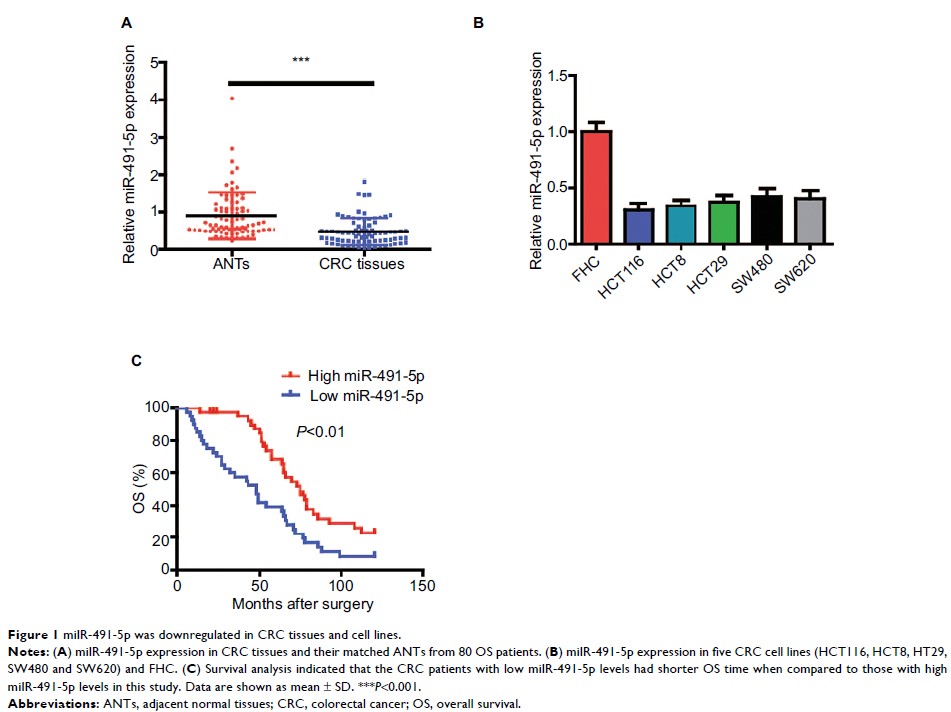108605
论文已发表
注册即可获取德孚的最新动态
IF 收录期刊
- 3.4 Breast Cancer (Dove Med Press)
- 3.2 Clin Epidemiol
- 2.6 Cancer Manag Res
- 2.9 Infect Drug Resist
- 3.7 Clin Interv Aging
- 5.1 Drug Des Dev Ther
- 3.1 Int J Chronic Obstr
- 6.6 Int J Nanomed
- 2.6 Int J Women's Health
- 2.9 Neuropsych Dis Treat
- 2.8 OncoTargets Ther
- 2.0 Patient Prefer Adher
- 2.2 Ther Clin Risk Manag
- 2.5 J Pain Res
- 3.0 Diabet Metab Synd Ob
- 3.2 Psychol Res Behav Ma
- 3.4 Nat Sci Sleep
- 1.8 Pharmgenomics Pers Med
- 2.0 Risk Manag Healthc Policy
- 4.1 J Inflamm Res
- 2.0 Int J Gen Med
- 3.4 J Hepatocell Carcinoma
- 3.0 J Asthma Allergy
- 2.2 Clin Cosmet Investig Dermatol
- 2.4 J Multidiscip Healthc

miR-491-5p 通过靶向 IGF2 起到抑制大肠癌肿瘤的作用
Authors Lu L, Cai M, Peng M, Wang F, Zhai X
Received 8 August 2018
Accepted for publication 4 December 2018
Published 22 February 2019 Volume 2019:11 Pages 1805—1816
DOI https://doi.org/10.2147/CMAR.S183085
Checked for plagiarism Yes
Review by Single-blind
Peer reviewers approved by Dr Andrew Yee
Peer reviewer comments 2
Editor who approved publication: Dr Xueqiong Zhu
Background: Dysregulation
of miRNAs is critically implicated in tumorigenesis, and aberrant expression of
miR-491-5p has been reported to play a key role in initiation and progression
of various cancers. However, the biological function and underlying mechanism
of miR-491-5p in colorectal cancer (CRC) remain elusive.
Methods: Quantitative
real-time PCR (qRT-PCR) was employed to evaluate the levels of miR-491-5p and
IGF2 mRNA expression in CRC tissues, cell lines and plasma. Cell counting kit-8
and colony formation assays were used to detect the effects of miR-491-5p on
CRC cell growth. Luciferase reporter assays were applied to confirm the
miR-491-5p target gene. In vivo experiments were conducted in nude mice.
Results: miR-491-5p
was found to be obviously downregulated in CRC tissues and cell lines, and
decreased miR-491-5p expression level was shown to be associated with
differentiation, TNM stage and poor overall survival (OS). miR-491-5p
overexpression suppressed CRC cell proliferation both in vitro and in vivo.
Mechanically, insulin-like growth factor 2 (IGF2) was identified to be a direct
target of miR-491-5p in CRC cells, and overexpression of IGF2 rescued the
miR-491-5p-induced suppression of proliferation in CRC cells. Finally, we
demonstrated that plasma miR-491-5p expression was decreased in CRC when
compared to healthy controls and might be an effective diagnostic biomarker for
CRC.
Conclusion: These
data showed that miR-491-5p functioned as a tumor suppressor by targeting IGF2
in CRC, and miR-491-5p could serve as a potential diagnostic and prognostic
biomarker for CRC.
Keywords: miR-491-5p,
IGF2, colorectal cancer, proliferation, biomarker
